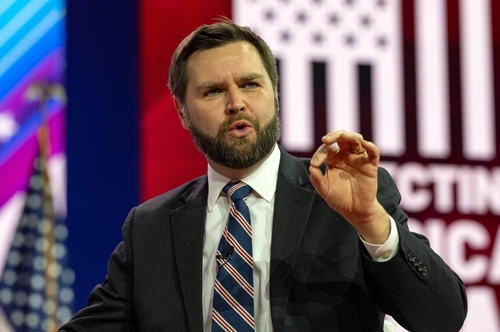Vance: Europe’s Unpaid Defense Is ‘Tax’ On US

Sen. J.D. Vance (R-OH) is speaking out about NATO nations and their failure to pay into defense spending, slamming European countries for forcing the United States to bear the brunt of the cost for security.
All NATO countries are required to spend a minimum of 2% of their GDP on defense spending, but only 11 of them met that target in 2023. Meanwhile, the U.S. spent 3.9% of its GDP on defense spending in 2023, essentially covering the security of these countries that have failed to pay their bills.
#NATO 👇 pic.twitter.com/V1gRjoFJbB
— Dominik Tarczyński MEP (@D_Tarczynski) February 12, 2024
While refusing to adequately contribute, these countries have been spending their money on vast welfare systems, all the while relying on the U.S. to protect them.
In an opinion column for the Financial Times, Vance condemned Europe for taking advantage of the generosity of the U.S. and pointed out that covering Europe’s defense is effectively a tax on Americans.
“The United States has provided a blanket of security to Europe for far too long,” the Ohio senator wrote. “In the aftermath of the Cold War, European nations made deep and lasting cuts to their defense budgets. Estimates suggest the continent would have spent an additional $8.6 trillion on defense over 30 years had they maintained Cold War levels of military expenditure.”
“As the American defense budget nears $1 trillion per year, we ought to view the money Europe hasn’t spent on defense for what it really is: an implied tax on the American people to allow for the security of Europe,” he added.
“There is frankly no good reason that aid from the U.S. should be needed,” Vance continued. “Europe is made up of many great nations with productive economies. They ought to have the capacity to handle the conflict, but over decades they have become far too weak.”
He then pointed out that the overpayment from the U.S. comes at “tremendous expense to its own citizens” — noting that it has shown “the shocking weakness of the defense industrial base on both sides of the Atlantic.”
“In Europe and America, fragmented defense industries make limited quantities of the most advanced weapons on earth, but struggle to produce heavy weaponry at the speed and scale needed to win a major conflict,” Vance wrote, adding that Russia is outproducing the U.S. and Europe in ammunition production.
“For all the talk about who spends the most on defense by percentage of gross domestic product, Russia currently makes more than twice the amount of artillery shells each month than Europe and the U.S. combined,” he added.
Vance also questioned whether European nations could even defend themselves, asking: “If our European allies can’t even defend themselves, are they allies, or clients?”
Further, he pointed out that the U.S. covering defense spending has weakened Europe.
“U.S. leaders across the spectrum support Europe and see the value of generations-old alliances,” Vance wrote. “But as we watch European power atrophy under an American protectorate, it is reasonable to ask whether our support has made it easier for Europe to ignore its own security.”
“We owe it to our European partners to be honest: Americans want allies in Europe, not client states, and our generosity in Ukraine is coming to an end,” he added. “Europeans should regard the conclusion of the war there as an imperative. They must keep rebuilding their industrial and military capabilities. And Europe should consider how exactly it is going to live with Russia when the war in Ukraine is over.”
Vance concluded by noting that “the time has come for Europe to stand on its own feet. That doesn’t mean it has to stand alone, but it must not continue to use America as a crutch.”
